Barack Obama has rejected the latest proposal from Republican leaders on how to avoid the fiscal cliff, dismissing their offer as unbalanced and based on faulty calculations.
A day after senior Republicans led by John Boehner, speaker of the House of Representatives, put forward their package of increased tax revenues and cuts in entitlements, Obama poured scorn on it, calling it "still out of balance. When you look at the math, it just doesn't work".
Obama's objections to the Boehner ideas, given in his first television interview since winning re-election on 6 November, centre on its lack of tax increases for the top 2% of US earners. Over the past few days the president has doggedly stuck to this point as a non-negotiable element of his fiscal plans.
"We're going to have to see the rates on the top 2% go up, and we're not going to be able to get a deal without it," he said in an interview with Julianna Goldman of Bloomberg TV.
Under their plans, the Republicans would allow an increase in tax revenue but through attacking the deductions that people are granted rather than by increasing the tax rate for high-income households. Obama said that the only way such an approach would add up would be if "you completely eliminated for example charitable deductions, that means every hospital and university and not-for-profit agency across the country would suddenly find themselves on the verge of collapse."
The president did hold out a possible carrot to the GOP, however, when he suggested that the deal that would need to be done in the next two weeks to avoid the fiscal cliff occurring on 1 January would be "down payments" on a longer term solution. "We're not going to be able to come up with a comprehensive entitlement reform package that gets it all done in the next two weeks," he said.
That opened the prospect of a temporary solution being found now, with the promise of a more substantial deal further down the line. Feasibly, that could involve the tax rate on the top earners rising now to 39.6% as the president insists, but being lowered again towards the end of 2013 by which time extensive tax reforms, properly conceived, could be introduced.
"We'd have to have some specific down payments now, recognising that we would then have to continue to work to see if we can come up with even better ideas to reduce healthcare costs over the long term," he said.
As the standoff between the White House and the GOP continued, the debate over how to combat the fiscal crisis widened, with a cross-party group of state governors arriving in Washington. With 40% of federal discretionary spending relating to grants to the 50 states, governors are worried that they will become the fall-guy as cuts are passed on to them.
Despite the impasse, Obama sounded an optimistic note on the US economy which he said was poised to take off. "Let's make sure we don't have a self-inflicted wound, because there are a lot of silly games played up on Capitol Hill."
The president deflected a question from Bloomberg TV on whether Republican attacks on the UN ambassador Susan Rice had "boxed him into a corner" over her possible appointment as secretary of state. Rice is presumed to be Obama's first choice to replace Hillary Clinton, but her comments on the attack on a diplomatic post in Benghazi, Libya, in which four Americans died, has engulfed her in a conservative firestorm.
Obama said he had not yet made a decision on who to nominate to be secretary of state, and swatted away the query by saying "the most important thing we can do for national security is to get our economy right".
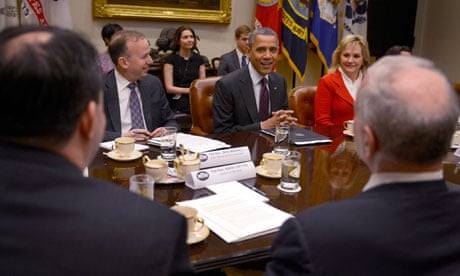
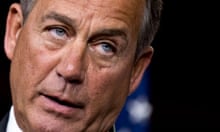
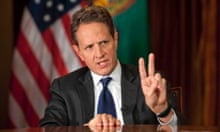
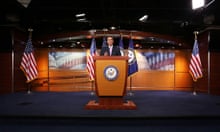
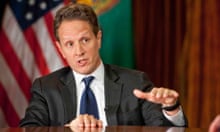
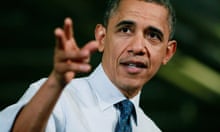

Comments (…)
Sign in or create your Guardian account to join the discussion